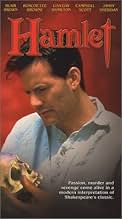The classic Shakespeare tragedy is revisioned in America at the turn of the 20th Century. Campbell Scott (Singles, The Spanish Prisoner) adapted, co-directed and stars in the title role with... Read allThe classic Shakespeare tragedy is revisioned in America at the turn of the 20th Century. Campbell Scott (Singles, The Spanish Prisoner) adapted, co-directed and stars in the title role with Tony Award winner Blair Brown (Copenhagen) as his mother Gertrude.The classic Shakespeare tragedy is revisioned in America at the turn of the 20th Century. Campbell Scott (Singles, The Spanish Prisoner) adapted, co-directed and stars in the title role with Tony Award winner Blair Brown (Copenhagen) as his mother Gertrude.
- Directors
- Writers
- Stars
- Directors
- Writers
- All cast & crew
- Production, box office & more at IMDbPro
Featured reviews
I have seen several different versions of "Hamlet" with various actors playing the title role, but Campbell Scott's portrayal is one of the best, revealing Hamlet's thoughts and emotions as if the viewer were inside his mind. Hamlet's decline into madness was justified (rather than simply "going insane" because the script ordered insanity) by the midnight vision of the ghost, and his flirtation with suicide was logical yet gripping. Perhaps the highest praise I can bestow is that, even though I was familiar with the play, I understood the inner motivations of the main characters in a fresh new way. Bravo!
All interpretations are valid to some respect, I suppose, but some choices the director makes end up radically altering the flow of the play; and any choice that REQUIRES excising 'inconvenient' bits of the text must be considered an alteration of the playwright's intent, rather than an interpretation. A few comments:
1) Campbell Scott's portrayal was quite good; he played Hamlet quietly and intensely rather than explosively, which is fair enough. But the decision to underplay other characters came off less well. For instance, Claudius barely seemed upset at all during his "My offense is rank" soliloquy. THIS was a soul in torment? (But bland Claudii are a pet peeve of mine.) And Gertrude, in her closet, often seemed unperturbed that she'd just seen her son kill a man. And most of all, having Laertes give his "That drop of blood which is calm proclaims me bastard!" speech in a controlled, subdued manner is basically an oxymoron. On the other hand, keeping the emotional level low was effective in creating an atmosphere of tension and creepiness throughout, rather than one of high drama and spectacle.
2) Nonetheless, POLONIUS IS A COMIC CHARACTER!!! To play him straight, with unrelenting quiet dignity, changes the whole tone of the first half of the play. You're SUPPOSED to laugh through the first two acts, to set you up for the shift that comes in with "The Mousetrap" and culminates in Polonius's death. Polonius, like Mercutio in "Romeo and Juliet", is a representation of Comedy itself, and his death marks the point from which there's no escape from tragedy. I see nothing gained by stripping Polonius of his laughs, and much lost (including, if nothing else, our simple AFFECTION for the character).
3) Another pet peeve: I own 6 "Hamlets" on DVD, 4 of them substantially 'complete', and yet EVERY SINGLE ONE OF THEM cuts Hamlet's observation: "This is the imposthume of much wealth and peace, which inward breaks and gives no outward show why the man dies" (said upon seeing the forces of Norway headed for Poland). This line is VITAL, because it is Hamlet's value judgment on Fortinbras; this is the line that shows that Fortinbras is a yob. As Hamlet admires the Player's capacity for passion while recognizing the absurdity of his concern "for Hecuba", so does he admire Fortinbras' boldness while recognizing the absurdity of wasting 2,000 men and 20,000 ducats "for a straw." And if it's not made clear that Fortinbras is an absurdity, then the irony of Hamlet's turning-over of Denmark to him at the end of the play is lost... (end of rant)
On the whole, if you're familiar with 'Hamlet' already I would say that this might be an interesting addition to your viewing inventory, but I would NOT recommend it as your first encounter with the work.
1) Campbell Scott's portrayal was quite good; he played Hamlet quietly and intensely rather than explosively, which is fair enough. But the decision to underplay other characters came off less well. For instance, Claudius barely seemed upset at all during his "My offense is rank" soliloquy. THIS was a soul in torment? (But bland Claudii are a pet peeve of mine.) And Gertrude, in her closet, often seemed unperturbed that she'd just seen her son kill a man. And most of all, having Laertes give his "That drop of blood which is calm proclaims me bastard!" speech in a controlled, subdued manner is basically an oxymoron. On the other hand, keeping the emotional level low was effective in creating an atmosphere of tension and creepiness throughout, rather than one of high drama and spectacle.
2) Nonetheless, POLONIUS IS A COMIC CHARACTER!!! To play him straight, with unrelenting quiet dignity, changes the whole tone of the first half of the play. You're SUPPOSED to laugh through the first two acts, to set you up for the shift that comes in with "The Mousetrap" and culminates in Polonius's death. Polonius, like Mercutio in "Romeo and Juliet", is a representation of Comedy itself, and his death marks the point from which there's no escape from tragedy. I see nothing gained by stripping Polonius of his laughs, and much lost (including, if nothing else, our simple AFFECTION for the character).
3) Another pet peeve: I own 6 "Hamlets" on DVD, 4 of them substantially 'complete', and yet EVERY SINGLE ONE OF THEM cuts Hamlet's observation: "This is the imposthume of much wealth and peace, which inward breaks and gives no outward show why the man dies" (said upon seeing the forces of Norway headed for Poland). This line is VITAL, because it is Hamlet's value judgment on Fortinbras; this is the line that shows that Fortinbras is a yob. As Hamlet admires the Player's capacity for passion while recognizing the absurdity of his concern "for Hecuba", so does he admire Fortinbras' boldness while recognizing the absurdity of wasting 2,000 men and 20,000 ducats "for a straw." And if it's not made clear that Fortinbras is an absurdity, then the irony of Hamlet's turning-over of Denmark to him at the end of the play is lost... (end of rant)
On the whole, if you're familiar with 'Hamlet' already I would say that this might be an interesting addition to your viewing inventory, but I would NOT recommend it as your first encounter with the work.
Usually, Americans playing Shakespeare make a hash of the language - see "Much Ado About Nothing" with Keanu Reeve and Robert Sean Leonard for unassailable proof. In this version of "Hamlet", though, Campbell Scott's unassuming, straightforward delivery of some of Shakespeare's most challenging lines is almost flawless. It is not that the American accent is unsuited to dealing with Elizabethan English, it seems, but the tradition of allowing the language to speak for itself is usually lacking with American actors. They seem to need to imbue everything with their own idea of what the character's emotional state should be, which the language, if it is powerful enough, should be able to do all by itself. As a result of seeing this version of "Hamlet", I have had to rethink completely my prejudices about Americans playing Shakespeare.
I have watched many versions of Hamlet. Some good and some bad. But this is the first Hamlet where I practically understand all of Hamlet's soliloques! Campbell Scott's performance as Hamlet really won me over. He plays Hamlet as a sensitive young man trying to come to grips with his father's untimely death and his mother's hasty marriage to his uncle. When this Hamlet sees the ghost of his father, he pretty much goes mad. And I mean, not just playing mad, but going mad.
There is something in the way that Campbell Scott saids his lines that makes me totally understand what Hamlet is feeling. Often times, I don't understand everything that Hamlet saids, but this time, I understood practically everything!
The rest of the cast is very good, especially Blair Brown who plays the queen.
I've watched this movie two times because I was fascinated by Campbell Scott's great performance. This was one of the few movie rentals that I've enjoyed in a long time.
Anyone who likes Shakespeare's work will love this version.
There is something in the way that Campbell Scott saids his lines that makes me totally understand what Hamlet is feeling. Often times, I don't understand everything that Hamlet saids, but this time, I understood practically everything!
The rest of the cast is very good, especially Blair Brown who plays the queen.
I've watched this movie two times because I was fascinated by Campbell Scott's great performance. This was one of the few movie rentals that I've enjoyed in a long time.
Anyone who likes Shakespeare's work will love this version.
Hamlet set in the pre-Civil War American South (more or less). Claudius, looks vaguely like a recent US president and talks with an Arkansas drawl. Polonius and Ophelia are Black; Polonius is the mansion's major-domo. Rosencrantz & Guildenstern dress, look, and talk like a couple of Mafiosi. The Ghost is a hoot. Hamlet, who speaks with a Midwestern accent, tends to mumble a bit
The text is straight Shakespeare--not a scene or even a line seems to be missing.
The strange thing about this pastiche is that it's engaging and actually works.
The text is straight Shakespeare--not a scene or even a line seems to be missing.
The strange thing about this pastiche is that it's engaging and actually works.
Did you know
- ConnectionsVersion of Le duel d'Hamlet (1900)
Details
Contribute to this page
Suggest an edit or add missing content

































